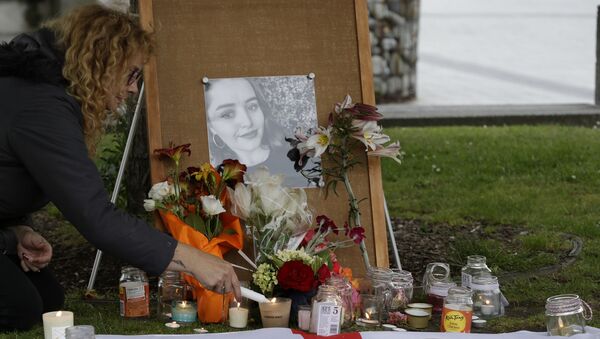A New Zealander accused of murdering 22-year-old Grace Millane, from England, has gone on trial in Auckland.
The 27-year-old cannot be named in New Zealand after a judge granted a name suppression order but his identity is already in the public domain because numerous British newspapers and websites published it last year.
Prosecutor Robin McCoubrey said Grace and the man met through dating app Tinder and went out on a date on 1 December 2018 during which they were seen kissing.
I can't imagine reading a real life account of an Auckland woman choking a *man* to death during sex, then falling asleep in the shower, watching porn & taking pics of his dead body, shoving him in a suitcase & dumping him in the bush. Heart goes out to family of #GraceMillane
— f*male b*tch (@Ahhmandah) November 6, 2019
But he said the man then strangled Grace and put her body in a suitcase and left it in his bedroom while he went out on another Tinder date the following night.
Mr McCoubrey said there was evidence on his computer that the man watched porn after killing Grace and then took intimate pictures of her dead body.
An ordinary New Zealander Sarah Canterbury says the Grace Millane case “hits a nerve” for many Kiwis.
Seeing some abso vile tweets. The same thing is happening with Amelia Bambridge as it did Grace Millane. You CANNOT blame them for what happened. They were exploring the world. Just because they were on their own does not mean they deserved to be targeted - they are the victims
— Kelsey O'Brien (@kelssobrien) October 31, 2019
“Kiwis do a lot of overseas experiences so for a female to do what a lot of us do and not be safe hurts us,” Sarah said.
She said: “We have all been her for a night but it has not ended that way. She should have been safe but women take for granted that we are not and take steps. For one moment she let her guard down and she should have been safe and she got killed. She really was representative of all girls and that’s why it broke us.”
the grace millane trial begins this week and i really hope the family are okay and find peace in it
— emma (@eversincenz) November 2, 2019
Grace's body was discovered in a forest a week after she vanished in downtown Auckland. She had arrived in New Zealand as part of a year-long trip, having finished her university course.
I know this is old news, but I find it frankly abhorrent that offshore media outlets are choosing to name the accused killer of Grace Millane.
— Jameson H (@jaybooty3) November 3, 2019
At the time New Zealand’s Prime Minister Jacinda Ardern spoke for many Kiwis when she said: "There is this overwhelming sense of hurt and shame that this has happened in our country.”
Her father, David Millane, said at the time: "We all hope that what has happened to Grace will not deter even one person from venturing out into the world and discovering their own overseas experience.”
Grace Millane murder trial: The key players in court https://t.co/C0RJNa0sdg pic.twitter.com/WGRIEp36Kk
— Stuff (@NZStuff) November 1, 2019
Sarah Canterbury said there had been anger in New Zealand at the time when some male social media users sought to blame Grace for going on a Tinder date before her death.
The defendant initially denied he had met Grace but later changed his story and told police she had died by accident during a sex game.
Grace Millane, 22
— We Can't Consent To This (@Wecantconsentto) November 6, 2019
Auckland, NZ
Grace, from Essex, had just graduated & was travelling the world.
She was killed on her birthday by a Tinder date. In his trial, he is claiming she asked him to strangle her.
She is the 59th UK woman killed by a man who claims sex, "gone wrong" pic.twitter.com/aneETv3bdg
Judges in New Zealand sometimes suppress the names of defendants if it is felt they will not get a fair trial if their identities are made public.
But the Grace Millane case has highlighted the difficulty of maintaining a name suppression order in the internet age.
Last year several British media outlets named the defendant in defiance of the New Zealand court orders and Google then emailed his name to users in New Zealand who were signed up for alerts.
This led to Justice Minister Andrew Little rebuking Google, who immediately the news alert service in New Zealand.
I know this is old news, but I find it frankly abhorrent that offshore media outlets are choosing to name the accused killer of Grace Millane.
— Jameson H (@jaybooty3) November 3, 2019
Sarah Canterbury said: “The media cannot use his name until the judge advises, which is usually at the point of conviction. New Zealand doesn’t have many of this type of murders so the media coverage has been huge and you can’t escape it. You can’t tell a jury to listen to the case but psychology will tell you early signs of prejudice are there already.”
She said that while the press coverage of the Grace Millane case is big in New Zealand, it will pale in comparison to the trial of Brenton Tarrant, the Australian-born gunman who shot dead 51 Muslims at two mosques in Christchurch in March this year.
Tarrant is due to go on trial next June and Ms Canterbury said the New Zealand media was putting together a code of ethics to try and prevent him from “grandstanding his hate messages” in the same way as Anders Breivik did after his attacks in Norway in 2011.



